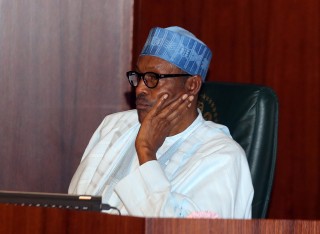“My wife belongs in the kitchen, the living room, and the other room.” Those are the three rooms defining most of the conversations in Nigeria in the last couple of days. That, and Aisha Buhari’s interview on BBC and the fact that Nigerians studying abroad are finding it increasingly difficult to pay fees and fend for themselves because of the current dollar/pounds to Naira exchange rate. Nigerians are not having it easy right now, but you know what makes matters worse? The country’s number one citizen, President Buhari, keeps adding gasoline to the fire.
Watch this video if you haven’t.
Does the president really care about inspiring confidence in Nigeria and his government?
In that video (0:40), the interviewer asked President Buhari what Boko Haram was given in exchange for the 21 Chibok girls that were released last week Thursday. President Buhari’s response was that he did not know and that he will find out when he gets back to Nigeria because it is not something that can be discussed over the phone, then he further implied that he knew nothing about how the negotiations took place.
Seconds later, the interviewer highlighted what reports were saying. There were reports that four Boko Haram prisoners were released in exchange for the girls, but the Nigerian government outrightly denied it, saying that there was no exchange of any kind. When the interviewer mentioned this to the president, he said, “Well, you see you are ahead of me. As soon as I go back, I will find out the written confirmation of how it all went.”
I picked out two points from the president’s statement: Either there is a deep problem of miscommunication within the federal government, which is reflected in the lack of communication between the government and the Nigerian people, or the president simply did not want to divulge what he considered confidential information. Whichever way, his answer does not inspire confidence. Time and time again, President Buhari has made statements that lead many to conclude that he just doesn’t care about what the people think of him. He says what he wants, the way he wants it without regarding the consequences.
President Buhari doesn’t seem to realise the impact of his words. In May 2016, former Prime Minister of Britain, David Cameron, was caught on video calling Nigeria “fantastically corrupt”. Buhari’s office released a statement saying that he had been “deeply shocked and embarrassed” by Cameron’s remarks. A few days later, President Buhari was asked if he, in fact, thought Nigeria was “fantastically corrupt” as Cameron had said; Buhari said “Yes”. That statement sparked outrage among Nigerians. While some applauded Buhari’s comment, others criticised it and said it was ill-representing of Nigeria. Is Nigeria a corrupt nation? Yes. But is it alright for her president to say it out loud in front of the global media? I don’t think so. One thing is certain, though, and it is that Buhari’s lack of concern for political correctness can sometimes come across as tactless and undiplomatic, and such behaviour is not confidence-inspiring.
Nigerians know that the president has a big task ahead of him. The responsibility of leading the world’s most populous and most powerful black nation is immense. No one is doubting or understating that. However, Buhari also has a responsibility, as a leader, to inspire the nation, to inspire the people to take positive action. At the moment, he is not doing a good job with that. Nigeria is going through a wilderness right now and we don’t need more sun, we need many oases and our president and his government are not doing enough to provide us with that.
Or better yet, should we just take this guy’s advice?
What do you think?








